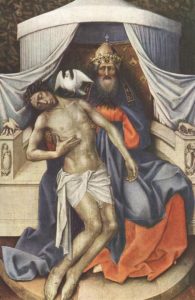Thoughts on Today’s Lessons for June 11, 2017

The Mourning Trinity (Throne Of God), 1433-1435, tempera on panel by Robert Campin (c. 1380-1444), the Flemish Master of Flémalle. Hermitage Museum, Saint Petersburg, Russia.
In recent weeks we have celebrated Christ’s ascension into heaven to sit at the right hand of the Father, and the Holy Spirit coming in wind and fire. Now we begin the long season after Pentecost by contemplating Father, Son and Holy Spirit in their mysterious dance, three persons in one triune God, the Holy Trinity. We begin where Scripture begins, hearing the first of the two creation stories that open the book of Genesis, portraying a monotheistic God – Creator, Word and Spirit wind moving over the waters – as a loving creative force at work in the world.
We hear again this beautiful Psalm of praise that we sang on the first Sunday of this year. We exalt the name of our Creator God, and we sing grateful thanksgiving for all of creation. We remember that, along with our God-given dominion over “the beasts of the field, the birds of the air, and the fish of the sea,” we have a solemn duty to preserve and protect them all, a duty that seems just as significant in our times as it did in ancient ages.
Alternate Psalm: Canticle 13
What’s a Canticle? These “little songs,” scripture passages that lend themselves to reading or chanting, are given in the Book of Common Prayer for use in daily prayer and, on occasion, as substitutes for Lectionary Psalms. Canticle 13 is the “Song of the Three Young Men” who sang this joyous hymn of praise to God and all creation as God protected them from death in the fiery furnace to which they had been condemned by an angry king. These final verses, added to this old song in modern Christian times, conclude the Canticle with resounding praise and exaltation to the Trinity: Father, Son, and Holy Spirit.
Second Reading: 2 Corinthians 13:11-13
You won’t find many explicit references to the Holy Trinity in the New Testament, as it took the early church nearly 300 years to fully work out basic Trinitarian theology as expressed in the Nicene Creed. We hear two of the most specific foreshadowings, though, in today’s second reading and Gospel. In Paul’s loving farewell at the end of his second letter to the people of Corinth, he urges this often squabbling congregation to sort out their conflicts and love one another as God loves them, asking this in the “grace of the Lord Jesus Christ, the love of God, and the communion of the Holy Spirit.”
Gospel: Matthew 28:16-20
Each of the Gospels ends in a different way, offering us four contrasting views of the resurrected Christ and his conversations with the disciples who would remain behind. Today we hear Matthew’s narrative. The risen Christ had told the women at the tomb to tell the eleven disciples to go on to Galilee, where he would meet them. Now we watch as they meet on a mountain. Some of them worship him, but others doubt, presumably only briefly. Then, invoking the names of the Father, Son and Holy Spirit, he commands them to go and “make disciples of all nations, baptizing them in the name of the Father, Son and Holy Spirit,” a great commission to Christian evangelism.
